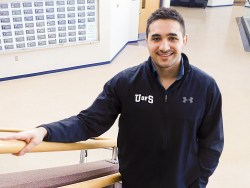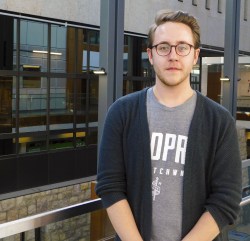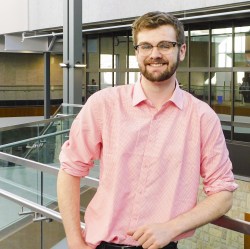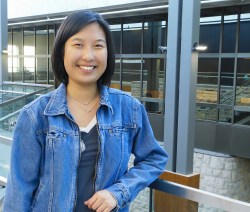Voting for the University of Saskatchewan Students’ Union executive positions, senate representatives and members of student council will open on PAWS at 9 a.m. on March 21 and run until 4 p.m. on March 22. The Sheaf spoke to the four executive candidates about their campaigns.
Since the executive candidates are uncontested this year, students will have the option to vote in favour of the candidates or cast an abstention vote. The USSU must hold a followup election for any executive positions that remain vacant if any of the candidates receive less than a majority of the votes.
Coden Nikbakht
fourth-year international studies student
President
The president is the head of the organization and co-ordinates the executive. As chief spokesperson of the USSU, they liaise with the U of S Board of Governors and manage the union’s relations with all levels of government.

What are your three platform points?
“As a Huskie athlete, I learnt the importance of support from your friends and from fans and how much of a difference that makes… I know it’s the same for all other sports on campus — I know it’s the same for the debate team, for people doing musical performances or any other extra-curricular [activity]. So, bringing campus culture to life, or revitalizing it, is definitely one of my points.
“I think, for many people, that education is a bridge between where they are now and what they want to accomplish in this world. I believe that it’s the government’s job to ensure there are no boundaries. The cost to go to university has been consistently rising, and our students are struggling… As president, I vow to bring together student leaders across Canada, so we become a powerful team to lobby government.
“My last point is parking on campus… I’ve missed classes, because I couldn’t find parking on campus. That is unacceptable, and this is real for many people… I’ve been saying that the university has a vast amount of land and resources. There’s no reason why we can’t develop something where every student can come to school, park their vehicles, [and] go to class without worrying about coming out and getting a ticket.”
After the interview, Nikbakht provided more information about this third platform point in an email to the Sheaf.
“I have created a short-term and a long-term plan to resolve this pressing issue. The short-term plan is to negotiate a profit-sharing model, so that the money being taken from our students through ticketing will be reinvested into our students through the USSU. My long-term plan includes working with the university to create efficient and affordable parking space(s) for our students,” Nikbakht said.
What makes your campaign stand out in comparison to past candidates’ campaigns?
“I believe that I’ll be a very strong advocate for all students — whether it’s dealing with municipal government, whether it’s in the legislative assembly in Regina or whether it’s on Parliament Hill in Ottawa. I’m well-connected to the broader community outside of the university as well, and I’m 100 per cent willing, regardless of who’s in power in any of those places, to be a strong voice for our students, and I think I can do the best at it.”
Sheldon Moellenbeck
fifth-year psychology student
Vice-president academic affairs
The vice-president academic affairs is responsible for academic advocacy on behalf of students, including student grievances, academic appeals and curriculum concerns. They also chair the Academic Affairs Committee.

What are your three platform points?
“I know one of the biggest parts of being the vice-president academic is you sit on a lot of academic committees on the university level, so in order to represent all students from different campuses fairly, I want to make sure I’m reaching out to different student groups, so I can hear what different colleges are facing.
“I want to promote the scholarships that we have on campus… I want to make sure that the resources that we have in place are being utilized. In the past, I’ve sat on some committees where we’ve dealt with student finances and awards on campus, and I know a lot of the awards go unclaimed. So, I want to make sure that students know of all the resources that we have available to make education [more] accessible to them.
“I’m going to prioritize the student experience. There’s a variety of ways I want to do that. I’m going to advocate for more experiential-learning opportunities. I want to advocate for a term-one reading week for all colleges… I want to advocate for more open textbooks and open educational resources, because a huge barrier to students for accessing education is the amount of money that they have to spend on textbooks.”
What made you want to run for this position?
“Just seeing from behind the scenes, working at the union for the past two years, there are things that I think that can be improved, so … that’s part of the reason I wanted to run. But, another part of the reason is because I haven’t had the most beautiful university career — I’ve had my struggles. I’ve worked two jobs for the past two years, while taking full-course loads. And, I know that there are a lot of barriers that make education not that accessible.
“I just feel like I’m coming from an empathetic standpoint, where I can try and humanize the USSU and make it more approachable, so students feel more safe accessing our services. We have a ton of services that benefit students, but I don’t think a lot of people know how to use them.”
Brent Kobes
fourth-year political studies student
Vice-president operations and finance
The vice-president operations and finance manages the union’s financial and internal operations and chairs the Budget and Finance Committee. They are also responsible for transit services and co-ordinating campus groups.

What are your three platform points?
“I’m going to try [to] continue to work with planning and priorities with the university … as well as the city at large to make sure that, when the Bus Rapid Transit system does get put into place, … it’s accessible to all students. Not just those that are able-bodied.
“The second major area of the portfolio for vice-president operations and finance is liaising with student groups. So, that means working with [the] Association of Constituency Presidents and making sure that student groups have an understanding of their liability, they have an understanding of governance, and they have an understanding of the services that both the USSU offers [and] the U of S offers.
“Student groups are the foundation of our campus community, and … I think that one of the most important roles of the job is to provide leadership to those students and to provide them with information and to pass along institutional knowledge, so that we don’t have situations where student groups fall apart throughout the year.
“The third major area that the vicepresident operations and finance deals with is the actual operations and finance of the USSU. So, that means preparing the budget, as well as making sure that the day-to-day operations of the USSU are in good standing … and [making] sure that the budget is lean, efficient and balanced but we’re still providing for the services for students.”
What made you want to run for this position?
“I’ve been involved in community organizations, and I think that this is just the next step. I think that’s why I chose this position, as compared to other positions… I think that being able to engage with students from all across campus is what excites me.”
Rose Wu
fourth-year psychology student
Vice-president student affairs
The vice-president student affairs is responsible for student housing, the safety and security of students, disability and equity issues, the USSU centres, and the health and dental plan, among other things. They also chair the Student Affairs Committee, the International Student Affairs Committee and the Sustainability Committee.

What are your three platform points?
“Wellness — I kind of grouped into that … mental health, safety, sexual assault, disability and equity and advocating for more study space.
“Community — part of it is diversity and inclusivity, partnering more with the International Student and Study Abroad Centre, and more cultural events that I think get people together to learn more about other cultures, and just increase involvement within the student body.
“Sustainability — I wanted to look into getting more bike racks, and I was thinking of posting events or fun competitions in the summer to get more people to walk or bike, if that works to encourage students and staff to be more sustainable.”
What makes your campaign stand out in comparison to past candidates’ campaigns?
“I’d say I’m outgoing and positive… I’ve been involved in other groups and work on campus, so that gives me like a bigger network — like friends that I could get ideas from and who I can get involved with.”
—
Sophia Lagimodiere
All posed photos by Olena Malko
Leave a Reply